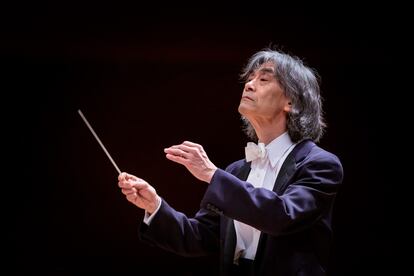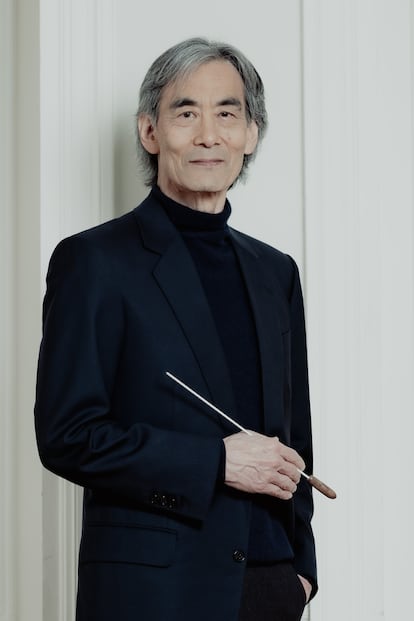The year 2024 ended with excellent news for classical music in Spain. The veteran and prestigious American conductor of Japanese descent, Kent Nagano (Berkeley, California, 73 years old), will succeed David Afkham in September 2026 as artistic and musical director of the National Orchestra and Choir of Spain (OCNE). The Ministry of Culture announced this appointment on December 18 as “a commitment to the definitive international launch of the OCNE.” An appointment that has been simmering under the technical direction of Félix Palomero, while the national teams finished conquering the Californian maestro.
“I have had four collaborations with very different repertoires and I must say that I was more and more impressed by the openness of the orchestra and the choir, their strong personality and true character,” Nagano explains to EL PAÍS by videoconference from Hamburg, where these days he directs The Flying Dutchmanby Wagner, as general music director at the State Opera of the German city. His first contact with the OCNE dates back to March 2014, when he directed the Fifth Symphonyby Mahler, “but then we made the absolute premiere of a contemporary composition by Arnaldo de Felice,” he points out. Upon his return, in June 2018, he faced The Bacchaeby Hans Werner Henze, “an opera from the second half of the 20th century that made me work with both the choir and the orchestra,” he adds.
His last two performances took place in June 2021 and April 2024. In the first he directed a composition by Olivier Messiaen, one of his specialties, since he debuted in Spain in 1986 with the premiere in our country of his opera Saint Francis of Assisiin concert version and in the presence of the composer. He added the Requiem de Faure and, on his last visit, he directed The creation by Haydn. “I have therefore explored the music of Messiaen, French Impressionism and Viennese Classicism, and I have been able to experience the intensity and special colors of the choir and orchestra on all of those occasions. In fact, the only thing I haven’t conducted with them is Spanish music, which I really want,” he confesses.
Nagano follows a ritual every time he takes responsibility for a new orchestra. First, study its history; Afterwards, he delves into the language of his musicians and tries to memorize their names. This is what he has done with all the ensembles he has directed as musical director: from the Berkeley Symphony Orchestra (1978) to the Gothenburg Symphony Orchestra (2013), passing through the Manchester Hallé (1991), the Deutsches Symphonie-Orchester in Berlin (2000) and the Montreal Symphony (2006), without forgetting his three decisive positions in opera houses in Lyon (1988), Munich (2006) and Hamburg (2015), which will culminate in June of this year. In fact, in several of them he has been named honorary director when his contract has ended.
He prefers not to advance any project with the OCNE before speaking with its members to establish a common objective. However, he is very clear about the cultural policy that he aspires to develop: “For me, literature, the visual and performing arts, both theater, dance, music and opera, as well as cinema, and even high technology have received an important influence of Spanish culture. And I think we should act as ambassadors of this culture. I speak to you as someone from the New World, as a Californian and a San Franciscan, where we feel a strong identity with what is Spanish,” he admits. He also values very positively the work started by Josep Pons and continued by David Afkham in the last two decades: “The orchestra brings together very experienced members, but it has a new, very young generation, and the result of that combination seems very stimulating to me. design projects with repertoire that show that cultural influence and allow us to act as their ambassadors,” he clarifies.

We talked about his interest in innovation in classical music through projects developed with various orchestras, such as the Montreal Symphony. In addition to introducing Mozart’s music to Inuit communities, he inaugurated a new headquarters in 2011 (the Maison symphonique) which he calls a “laboratory.” “It is very important to present great works in a context that resonates in current times. In other words, if people do not go to Beethoven or Falla concerts, it is not the fault of Beethoven or Falla, but of how we present those works and how we interpret them,” he admits.
He talks about all these experiences in his first book, Classical music. Expect the unexpectedwhich he published in German in 2016 and later in English. “The idea of writing it came to me when I heard a politician say that classical music was only for elites of a certain education and economic class. It seemed to me an arrogant and historically erroneous perspective, since from the Age of Enlightenment onwards, exactly the opposite happened and music opened up to the whole world and was no longer limited to the court or the church,” he adds. Nagano aspires to renew that spirit in the present with the intention of counteracting the separation of society: “We need classical music more than ever to overcome polarization,” he insists.
These ideas have led him to refute the opinion of Mario Vargas Llosa, expressed in his book The civilization of the spectacle (Alfaguara, 2012), that the democratization of culture has had the undesirable effect of trivializing and subduing it. Nagano thinks differently: “I’m not so concerned about the survival of a star-based classical music industry as I am about depriving ordinary people of their experience, that that deprivation will cause classical music to disappear from schools, to stop being practiced in home or performed by amateur ensembles,” he maintains.
In fact, the American director has published a second book in German titled Ten life lessons. What really counts (2021), where he reviews several encounters with people who amazed him and taught him something fundamental. The book is about the self-questioning that he learned from Leonard Bernstein or the concern of composers to be understood, as in the case of Pierre Boulez, but it also addresses the authenticity that a rock heterodoxist like Frank Zappa taught him, when he became interpreter of his complex symphonic scores, or the coincidence that led him to discover in Björk’s post-punk voice the most memorable interpreter of Pierrot Lunairede Schönberg.
Nagano is a director with an admirable mastery of interpreting intricate scores and making their architecture transparent. A good example is his admirable recording of Saint Francis of Assisiby Messiaen, in which he conducted the Hallé Orchestra in 1998 at the Salzburg Festival (DG). He is also a musician whose precision is not at odds with tenderness and spontaneity in the romantic repertoire, as we can hear, for example, in his exciting version of the Idyll of Siegfriedby Wagner, in 2008, with the Bayerischen Staatsorchester (Farao). But his family environment, with an architect and engineer father who instilled in him the ability to think structurally and a mother, a microbiologist and pianist, who opened the doors of literature and music, was key to forging his personality.
And we should add the farm where he grew up in Morro Bay (California), a small town that, in the fifties and sixties, became a social and musical paradise in the middle of nowhere, five hours from Los Angeles and San Francis. “Due to its isolation and affordable economy, Morro Bay became, from the beginning of the 20th century, a very attractive place for waves of European and Asian immigrants. For this reason, it was particularly international, with fishermen, Sicilians, Portuguese artisans, a population arriving from Spain, France and Germany, as well as Irish and Scots, and even Swiss Italians. But there were also orientals, like my grandparents, who arrived from Japan at the end of the 19th century. And everyone shared their culture,” he remembers.
He is joined by his teacher, Wachtang Botso Korisheli (1921-2015), a Georgian musician trained between Moscow and Munich who turned the Morro Bay primary school into a fascinating laboratory of sounds. “Professor Korisheli instilled in us an ideal musical education that combined the discipline of a Soviet Conservatory and the rigid and intensive teaching of a German Hochschule,” he says. But musical life in Morro Bay was relentless. “Apart from school or church, we listened to Italian operas or German symphonies at home and made music with friends, so I grew up with Bach, Mozart, Beethoven and even Bruckner, whose symphonies I learned by playing them on the piano with a neighbor,” he recalls. And Spanish was always very present. “Please note that Morro Bay was discovered and founded by Juan Rodríguez Cabrillo, one of the great Spanish explorers of the 16th century,” he concludes.

